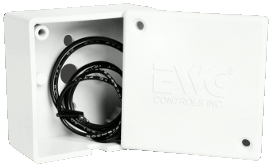OAS | OAS Outside Air Sensor | EWC Controls
Documents and manuals
EWC Controls OAS Documents
Overview
Details for OAS
The “OAS” Outside Air Sensor allows precise real time monitoring of the Outside Air temperature on your Zoned HVAC system. The Optional “OAS” wires directly into the BMPlus series, UZC4 series or UT3000 control panels allowing the Control System to monitor the outside air temperature. Using the adjustable potentiometer on the Control Panel or the LCD menu, the installer can set the desired outdoor temperature changeover setting, to engage supplemental or backup heating systems. The OAS comes standard with the HK2000 Economizer System. Refer to the Hk2000 Technical Bulletins for the specific Outside Air Features & Functions provided, with that product. The OAS is a versatile device because it can be mounted on an outside wall or an outside air duct. See Pages 2, 3 & 4. Make sure the OAS is mounted completely outside of the house. Avoid direct sunlight. Do not mount the OAS low to the ground where snow can cover it. Do not mount the OAS close to exhaust vents of any type. Use a dedicated 2 conductor 18AWG solid copper jacketed thermostat cable to connect the OAS to the Zone Control System, Economizer or the Smart Humidistat. Avoid running cable in close proximity to line voltage circuits, or inside a conduit with other circuits. Avoid wire runs in excess of 100 ft. The Sensor wiring is not polarity sensitive. OAS equipped panels have a designated terminal block for the OAS. Be sure to enable the OAS Dip switch. Now dial in the Outside Air Changeover setting you desire. Dual fuel Heat Pumps and Multi-Stage Heating systems can be controlled without the need for bulky mechanical outside air thermostats or expensive dual fuel kits. To test an OAS disconnect the wire leads from the control panel and remove it from the duct. At room temperature (75F.) the ohm reading on an OAS will be approximately 10.5K ohms (10,500 ohms). Or leave the OAS where it is and place a separate temperature probe of known accuracy in the same location as the OAS and measure the OAS resistance against the table provided on page 4. You should measure a value within 5% of the table value and the separate temperature probe reading.
Specifications
| Item Number | OAS |
| Brand | EWC Controls |
Reviews
Recently Viewed













